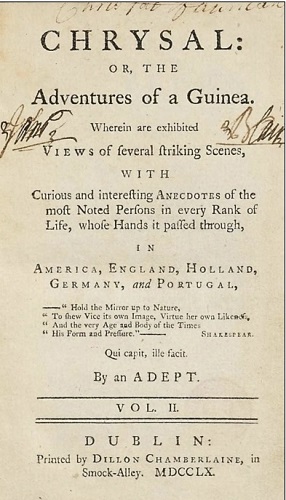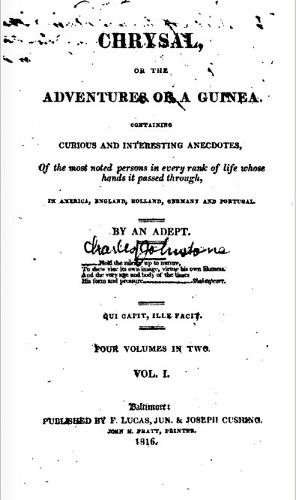Life
c.1719-1800 [pseud. “Oneiropolos”]; b. Carrigogunnel, Co. Limerick, educ. TCD; prob. left without a degree; called to the English bar; prevented from practising by deafness; worked unsuccessfully as chamber lawyer and turned to writing; issued Chrysal, or the Adventures of a Guinea (1760-65), in 4 vols., a succès de scandale purporting to reveal political secrets and expose the profligacy of well-known public characters, being narrated by the spirit of gold in a guinea coin and set in various countries where it circulates - being the first of a subsequently popular genre; wrote first two vols. while visiting George Edgcumbe (3rd Baron Edgcumbe) in Devon, supposedly based on ecumenical ideas of Bishop Robert Clayton [q.v.]; a key to the characters in it was afterwards published; issued The Reverie (1763), a satire on public characters; sailed for India, May 1782; underwent shipwreck on the voyage; employed on the Bengal newspaper press, writing as “Oneiropolos”; became joint-proprietor; d. Calcutta, in some prosperity. DNB OCIL DIB/RIA
[ top ]
Works
|
| In trans. |
|
 |
 |
| Chrysal: or, The Adventures of a Guinea (Dublin 1760 & Baltimore 1816) | |
[ Click on each image above to view enlarged them in separate windows. ]
Bibliographical details
Chrysal: or, The Adventures of a Guinea: Wherein are exhibited views of several striking scenes, with curious and interesting anecdotes of the most noted persons in every rank of life, whose hands it passed through, in America, England, Holland, Germany and Portugal. / By an adept [4 vols.] (Dublin: Dillon Chamberlaine, Smock Alley MDCCLX [1760) [unauthorised?]; Do. [2nd edn.; greatly enlarged and corrected] (London: printed for T. Becket 1761); Do. [3rd edn.; 4 vols. in 2] (London: London, J. Hill 1767); Do. [new edn.] (London: printed for J. F. and C. Rivington; G. Robinson; T. Cadell; T. Evans; and R. Baldwin 1783); Do. (London P. Lucas Jun. & Joseph Cushing 1816); Do. (Baltimore: F. Lucas, Jun. & Joseph Cushing 1816); Do. (NY: Huntingdon 1816); Do., 3 vols. [new edn.] (London: printed for Hector M’Lean by Howlett and Brimmer 1821); Do. [3 vols.] (London: Samuel Richards 1822) [11 lvs. of pls.]; Do., 3 vols. [Cooke’s Edition] (London: Cooke 1821-24?); Do., as Chrysal, or the Adventures of a Guinea ; ed. E. A. Baker (1908); Do., as Chrysal, with an introduction by Malcolm Bosse [facs. edn.] (NY: Garland Press 1979).Anthologised: The Novels of Le Sage, and Charles Johnstone - Gil Blas, The Devil on Two Sticks, and Vanillo Gonzales [all] by Le Sage, and The Adventures of a Guinea, by Johnstone - to which are prefixed memoirs of the lives of the authors, ed. by Sir Walter Scott (London: Hurst, Robinson, and Co., 1822).
[ top ]
References
Robert Welch, ed., Oxford Companion to Irish Literature (OUP 1996) - “Charles Johnstone”: ‘[...] Johnstone’s sympathetic treatment of the ordinary Irish and his depiction of a corrupt English administration in Ireland is vitiated by several explicitly anti-Catholic and anti-semitic passages. Arsaces (1774), a much admired oriental tale, is a thinly-veiled allegory of the worst effects of colonialism in America. Anthony Varnish (1781) and John Juniper (1786), also attributed to Johnstone, use Irish characters and locations, the latter including scenes in Portarlington, Co. Laois, and Dublin, whence the hero embarks to seek his fortune in England. See Michael Shugrue, ed., Arsaces, Prince of Betlis (1975), and Ronald Paulson, ed., Chrysal, or the Adventures of a Guinea (1979).’
RIA DIB: “Charles Johnstone”, by Patrick Geoghegan: b. Carrigogunnell, Co. Limerick, son of Thos. Johnstone (or Johnson) and his wife (née Sharpe); entered TCD; left without degree; went to London where a cousin, John Palmer, was a solicitor; entered Middle Temple and called to bar but did not prosper apart from minor chamber work; afflicted by partial deafness; turned to writing; Chrysal (1760-65), narrated by a guinea coin, was an immediate popular success; widespread interesting in identifying models for characters; covered America, Britain, Holland, Germany and Portugal; contrib. many pieces to journalism; Irish generally well-portrayed; some notable passages of anti-Catholic and anti-semitic writing; incls. call for universal suffrage and women’s education; employed by govt. to investigate claims of soldiers in Germany, receiving £2,000 and £3,000 for services, 1763; published Arsaces (1774), satirising colonial America; imprisoned in debtor’s prison; resided at Dieppe, returning to London 1778; prob. wrote Buthred, a lost novel; Also Anthony Varnish (1781) and John Juniper (1781) - attrib. to him; emig. to India, 1782; shipwrecked off Africa in the Brilliant [ship], and eventually rescued; prop. of a Calcutta newspaper, writing as “Oneirpolo”; believed to have married “an amiable lady” (N. Munster Antiq. Jnl. 1909); d. circa 1800, at Calcutta; called “a prose Juvenal” by Sir Walter Scott. Bibl. incls. Gent. Mag. (1794 & 1807); Allibone, DNB, A. E. Baker, ed., Chrysal [.. &c.] (1908); Charles Lund Cleeve, in British Novelists, 1660-1800, 2 vols., ed. Battestin (1985); Robert Welch, Oxford Companion to Irish Literature (1996); Loeber & Loeber, A Guide to Irish Fiction 1650-1900 (2006).
Namesake?: See also: Charles Edward Johnstone, The Indian Morse Circuit: being a manual of practical telegraphy, descriptive of the instruments, connections, and technical working of the Government Telegraph Department - designed as a guide to the study of telegraphy (Roorkee 1875) (COPAC).
[ top ]